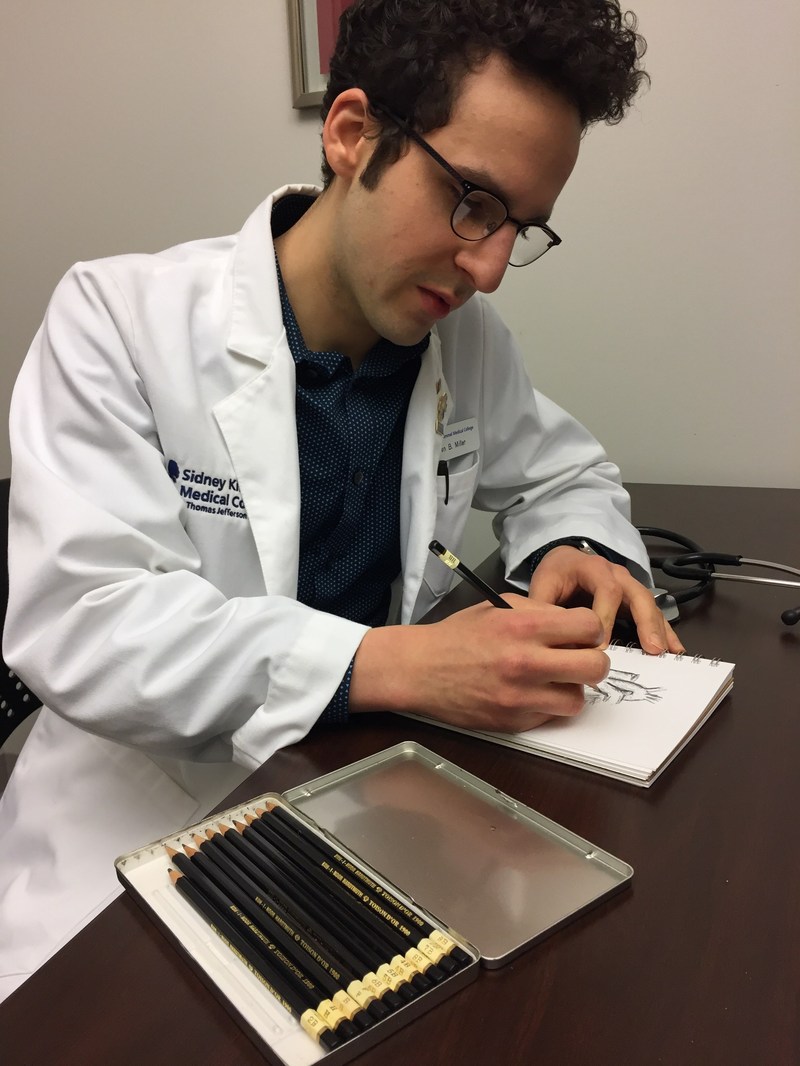PHILADELPHIA and NEW ORLEANS, Jan. 30, 2018 /PRNewswire/ — Medical students who spend more time engaging in the arts may also be bolstering the qualities that improve their bedside manner with patients, according to new research from Tulane and Thomas Jefferson universities. The study, published in the Journal of General Internal Medicine, finds that students who devoted more time to the humanities during medical school had significantly higher levels of positive physician attributes like empathy, tolerance of ambiguity, wisdom and emotional intelligence while at the same time reporting lower levels of adverse traits like burnout.
Aaron Miller, a first year medical student at Sidney Kimmel Medical College, is enrolled in the Medicine+Humanities Scholarly Inquiry Track. Research published out of Tulane and Jefferson show that exposure to the humanities is correlated with positive physician attributes like empathy.
“The humanities have often been pushed to the side in medical school curricula, but our data suggests that exposure to the arts are linked to important personal qualities for future physicians,” said senior author Marc Kahn, MD, MBA, MACP, the Peterman-Prosser Professor and Senior Associate Dean in the Tulane University School of Medicine. “This is the first study to show this type of correlation.”
Through an online survey, the team measured exposure to the humanities (music, literature, theater and visual arts), positive personal qualities (wisdom, empathy, self-efficacy, tolerance for ambiguity and emotional appraisal) and negative qualities associated with well-being (physical fatigue, emotional exhaustion and cognitive weariness) in 739 medical students at five medical schools across the country.
Those who reported more interactions with the humanities also scored higher in openness, visual-spatial skills and the ability to read their own and others’ emotions. Those with fewer interactions scored higher for qualities associated with physician burnout such as physical fatigue and emotional exhaustion.
“The fields of art and medicine have been diverging for the last 100 years,” said Salvatore Mangione, MD, Associate Professor of Medicine in the Sidney Kimmel Medical College at Thomas Jefferson University and first author. “Our findings present a strong case for bringing the left and the right brains back together – for the health of the patient and the physician.”
Jefferson encourages student engagement in the arts and humanities to foster the essential skills related to healthcare including observation, critical thinking, self-reflection and empathy. The JeffMD curriculum, through the Medicine + Humanities Scholarly Inquiry track, is a formalized approach to embedding humanities into medical school.
GOT NEWS? click here
Google News, Bing News, Yahoo News, 200+ publications
Similarly Tulane offers an elective course in medical humanities as well as student programming and community service opportunities that engage the arts. Tulane’s Creative Scholars Program offers early acceptance to undergraduate honor students in arts and humanities majors. Slightly less than half of the school’s first-year class of students earned undergraduate degrees in liberal arts.
The authors report no conflicts of interest or external funding sources. Research supported by consortium of five medical schools: Sidney Kimmel Medical College at Thomas Jefferson, Tulane, The Warren Alpert Medical School of Brown University, Oregon Health & Science University School of Medicine and Cooper Medical School of Rowan University.
![]() View original content with multimedia:http://www.prnewswire.com/news-releases/arts-and-humanities-in-medical-school-promote-empathy-and-inoculate-against-burnout-300590318.html
View original content with multimedia:http://www.prnewswire.com/news-releases/arts-and-humanities-in-medical-school-promote-empathy-and-inoculate-against-burnout-300590318.html
SOURCE Thomas Jefferson University







